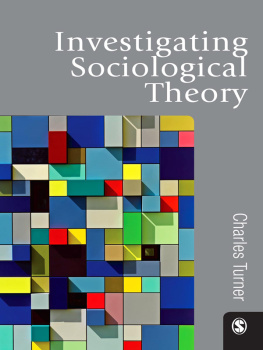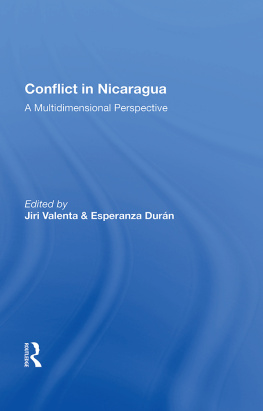INDIVIDUALISM, HOLISM AND THE
CENTRAL DILEMMA OF
SOCIOLOGICAL THEORY
INDIVIDUALISM, HOLISM AND
THE CENTRAL DILEMMA OF
SOCIOLOGICAL THEORY
BY
JI UBRT
Charles University, Prague, Czech Republic
Emerald Publishing Limited
Howard House, Wagon Lane, Bingley BD16 1WA, UK
First edition 2019
Copyright 2019 Ji ubrt
Published under an exclusive licence
Reprints and permissions service
Contact: permissions@emeraldinsight.com
No part of this book may be reproduced, stored in a retrieval system, transmitted in any form or by any means electronic, mechanical, photocopying, recording or otherwise without either the prior written permission of the publisher or a licence permitting restricted copying issued in the UK by The Copyright Licensing Agency and in the USA by The Copyright Clearance Center. Any opinions expressed in the chapters are those of the authors. Whilst Emerald makes every effort to ensure the quality and accuracy of its content, Emerald makes no representation implied or otherwise, as to the chapters suitability and application and disclaims any warranties, express or implied, to their use.
British Library Cataloguing in Publication Data
A catalogue record for this book is available from the British Library
ISBN: 978-1-78769-038-7 (Print)
ISBN: 978-1-78769-037-0 (Online)
ISBN: 978-1-78769-039-4 (EPub)
Contents
About the Author
Ji ubrt has lectured in Sociology at Charles University, Prague, Czech Republic, since 1990. It was in 2009 that he founded the Department of Historical Sociology at the Faculty of Humanities. Ji is the author and editor of numerous books, mainly dealing with contemporary sociological theory, particularly with regard to issues of action, structure, social systems and social change, and among his most recent works is The Perspective of Historical Sociology: The Individual as Homo-Sociologicus through Society and History, published by Emerald in 2017.
List of Reviewers
Professor Dr. Helmut Staubmann | University of Innsbruck, Austria |
Professor Dr. Andreas Pitasi | Gabrielle DAnnunzio University, Italy |
Professor Dr. Johann P. Arnason | La Trobe University, Australia |
Acknowledgements
This book is the result of my long-term involvement in contemporary sociological theory. I have lectured on these topics for more than a quarter of a century at Charles University, Prague, publishing a large number of more or less extensive studies, especially in my mother language. Now I want to address my knowledge, ideas and views to a broader professional public. The bulk of this work (Sections 1 and 2) is of a synoptical, summarizing and comparative character; the follow-up part (Section 3) attempts on the basis of long-term reflection on the problems and critical analysis of the field to formulate an outline of my own; an original and as I hope innovative conception. In the formation of my views on a given area of sociological thinking, important contributions in addition to studying the vast amount of theoretical literature have been made by a dazzling range of number of experts who have allowed me to consult on and discuss questions and ideas with them. These have included, among others, Thomas Luckmann, Hans Joas, Ilja Srubar, Dirk Kaesler, Willfried Spohn, Bernhard Giesen, Harald Wenzel, Wolfgang Knbl, Helmut Staubmann, Christoph Reinprecht, Johann Arnason, Dennis Smith and Patrick Baert. Each of them at different times and to varying degrees has greatly shifted my thinking about sociology and helped me find the way to my own thoughts, and I am therefore indebted to all of them. My thanks also belong to those who have assisted me in the processing and editing of individual parts of the text; among these are the executive editor of the Czech Sociological Review, Robin Cassling, and especially my long-time friend, proofreader and language advisor, Edward Everett. Without their help, this book would not work as it does.
Introduction
Individualism and holism, the concepts embedded in the title of this book, represent two key theoretical perspectives that have for many decades steered and shaped sociological thought. For over a century, these two interpretative perspectives have also divided sociological theory into two camps, accompanied by a band of scholars trying to bridge this dualism.
According to American sociologist Jeffrey C. Alexander, individualist theories derive their appeal and strength from their underlying assumption that humans make decisions as individual, free, autonomous and rationally and morally consistent beings. A related belief is that they are able to express these qualities in their actions regardless of the situation in society or what economic or moral conditions prevail. The problem with this outlook, Alexander notes, is that it is premised on a notion of voluntarism that ignores or underestimates the forces arising from the structures of society. Nor does it give sufficient consideration to how the real space in which individual will is exercised is determined by surrounding society.
Collectivist (i.e. holistic) theories, unlike individualism, assign primacy to social entities (societies, systems, groups, classes, organisations, etc.). The collectivist perspective is important because it creates the basic precondition through which entities can become the subject of deliberate sociological analysis. However, there is a price for fulfilling this precondition. The emphasis it places on the collective, and on larger entities, logically means that the individual will and free human decision-making tends to be lost from the field of view (Alexander, 1987c, p. 13).
The basic question of this book relates to the dilemma between individualist and holistic approaches in sociological thought, and consideration of it is organised into three parts. The first is devoted to sociological theory as a general problem and aims to lay out the wider context. The second looks at the directions presented to sociological thought by individualist and holistic lines of interpretation, also describing attempts to unite these two perspectives. The books focal point is the third part, where an effort is made to resolve this issue, involving a critical approach to Berger and Luckmanns constructivist conception, a reconsideration of the concept of social roles, inspiration from Durkheims idea of homo duplex, and a redefining approach to certain familiar theoretical concepts. The authors own outline solution in successive steps faces off with Giddens theory of structuration, which can be considered one of the most elaborate attempts to date to create a unified explanatory model. Alongside this is the observation that there are certain related issues whose resolution is important not just from the perspective of general sociological theory, but also for the orientation of empirical sociological research. The ideas formulated herein may to some degree be controversial, but it is hoped that they provoke discussion which moves us forward in our endeavours.







